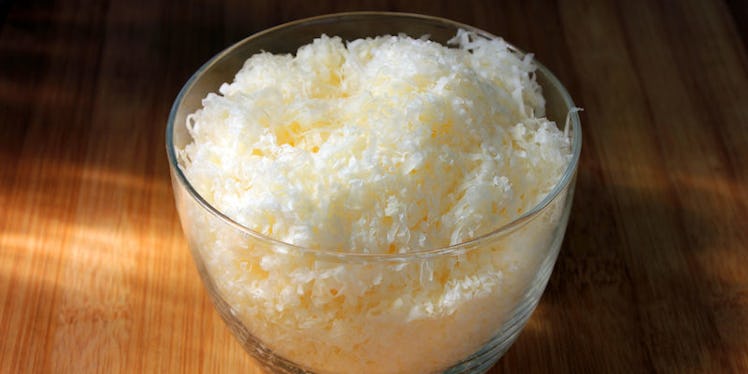
There's A Scary Thing You Should Know Before Eating Parmesan Cheese
Apparently, there's a chance the Parmesan cheese you've been eating might actually contain wood.
According to Bloomberg, the US Food and Drug Administration released a report stating cheeses labeled 100 percent Parmesan cheese often contain cellulose, an anti-clumping agent made from wood pulp, and sometimes cheddar cheese, which is cheaper than Parmesan.
Pennsylvania-based Castle Cheese Inc. was found to have produced so-called Parmesan cheese that contained little to no actual Parmesan for nearly 30 years.
Reportedly, inside the cheese containers were mixtures of swiss, mozzarella, white cheddar and cellulose.
Neal Schuman, who runs the largest supplier of hard Italian cheeses in the country, told Bloomberg an estimated 20 percent of cheese produced in the US is falsely labeled.
Castle Cheese products were previously sold at Target and supplied to Associated Wholesale Grocers, Inc., which distributes groceries to 3,400 retail stores in 30 states.
Later this month, the president of Castle Cheese will reportedly plead guilty to charges that could result in up to a year in jail and a $100,000 fine.
Cellulose is apparently not harmful as long as it makes up no more than 4 percent of the product.
Bloomberg, however, conducted experiments that found 8.8 percent cellulose in Jewel-Osco's Essential Everyday 100% Grated Parmesan Cheese, 7.8 percent in Walmart's Great Value 100% Parmesan Grated Cheese and 3.8 percent in unspecified Kraft products.
Walmart spokesman John Forrest Ales told Bloomberg a "compliance team is looking into these findings," while Jewel-Osco spokeswoman Mary Frances Trucco said the company was also investigating the results of the experiment.
One can probably guess why companies don't use 100 percent real Parmesan cheese: money.
Marty Wilson, CEO of major Parmesan cheese supplier Sugar Foods, said he's lost contracts to competitors who sell fake cheese for cheaper costs.
Bob Greco of Cheese Merchants of America said using fake cheese allowed competitors to underbid him by up to 30 percent.
Parmesan cheese is also more likely to contain fillers than other cheeses because Parmesan wheels lose more moisture than other cheeses while they're being cured, which leads to a decrease in total volume.
One hundred pounds of milk might yield 10 pounds of cheddar and only 8 pounds of Parmesan.
This difference may seem minute, but it could actually deprive manufacturers of millions of dollars, according to Bloomberg.
Citations: The Parmesan Cheese You Sprinkle on Your Penne Could Be Wood (Bloomberg)